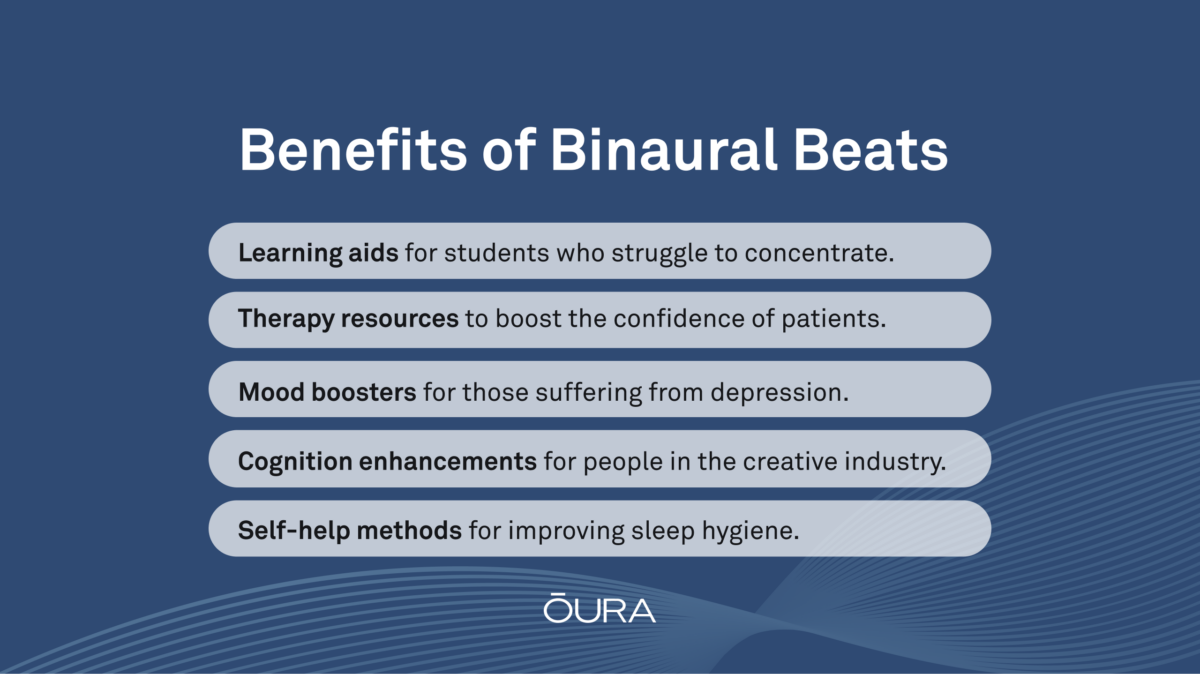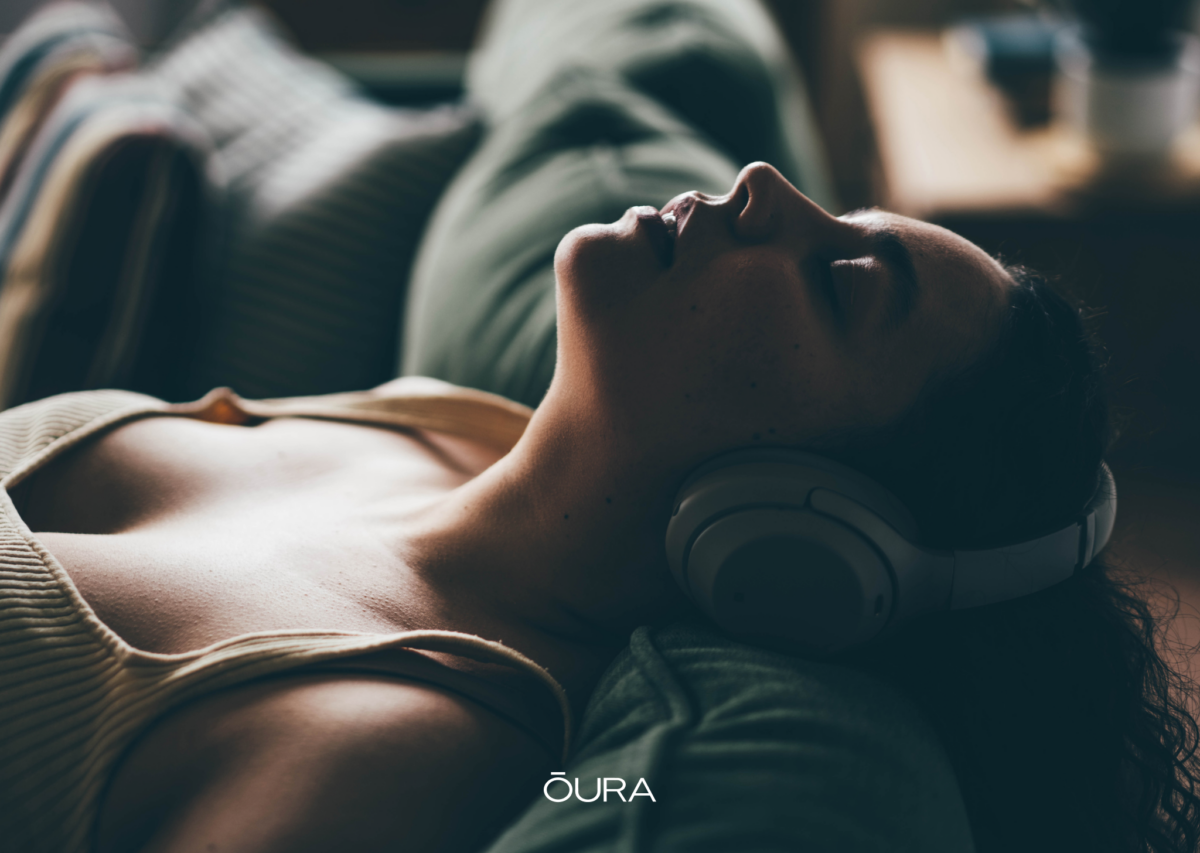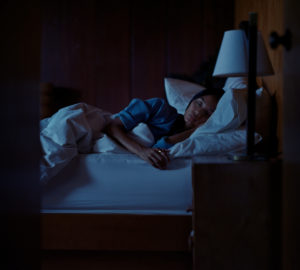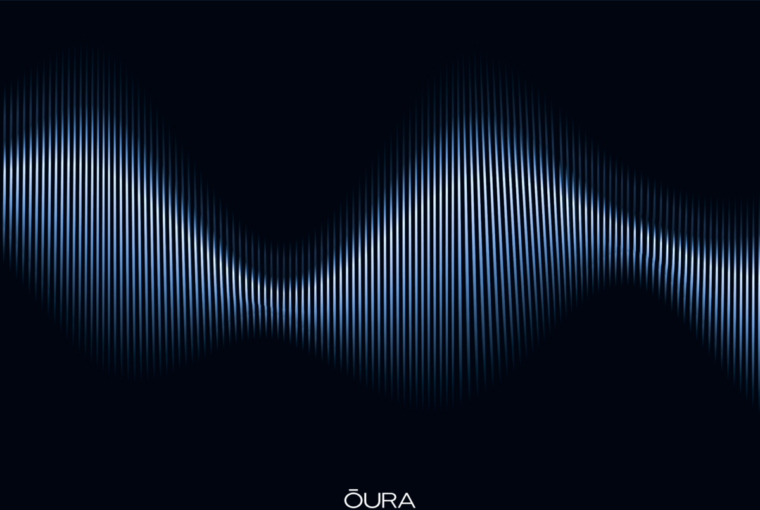If your Oura Sleep Score has signified that your restorative sleep is on the low side, it’s time to consider what can be done about it. One potential way to improve sleep is to binaural beats, a type of audio that involves two slightly different frequencies in your right and left ear at the same time.
READ MORE: The Healing Power of Sound: 5 Benefits of Sound Meditation
What are Binaural Beats?
Binaural beats are a type of auditory stimulation that involves playing two slightly different frequencies into your left ear and right ear simultaneously. Because of the difference between the two original frequencies, your brain will perceive a third tone. For example, if you listen to a 420 Hz tone in your left ear and a 430 Hz tone in your right ear, your brain will perceive a 10 Hz binaural beat. (Hz stands for hertz, which represents the number of sound wave cycles occurring per second.)
Due to their effect on brainwave frequency, binaural beats have become the subject of pilot studies and groundbreaking research. This research has identified various potential benefits, including:
- Improved concentration and focus: Low-frequency binaural beats are associated with mental relaxation and high-frequency ones with alertness and attentional concentration. The mental relaxation is particularly important for improving confidence and boosting memory.
- Reduced stress and anxiety: In one study, listening to 16 Hz binaural beat stimulation mitigated stress levels by 20% and reduced stress hormones by 44%.
- Improved mood: Auditory stimulation using binaural beats has been shown to enhance sleep quality and post-sleep mood thanks to its ability to reduce stress and anxiety.
Below are some applications already being put into practice based on the potential benefits:

The possibilities grow with every piece of research. While these are equally as interesting, the focus here will be on the connection between binaural beats and sleep quality.
RELATED: Oura Adds Sleep Sounds To Help You Drift Off To Sleep
Can Binaural Beats Help You Sleep Better?

The potential benefits of binaural beats have been evidenced in various studies and suggest that they work to promote slow-wave stages of sleep and relaxation when used at the right frequency.
Brain activity will naturally synchronize with the binaural beat frequencies, which can trigger certain brain waves. Doing this influences your mental state, so it’s important to learn which frequencies have what effect.
- Theta: Encourages REM sleep, reduces anxiety, and induces meditative states.
- Delta: Promotes deep sleep and relaxation.
- Gamma: Improves mental clarity and focus.
- Beta: Improves concentration, problem-solving, and memory.
- Alpha: Increases positivity, decreases anxiety, reduces levels of cortisol, and heightens relaxation.
So, which ones are right for you? Theta and delta, which are low-frequency ranges (between 1 and 8 Hertz), slow down your brain waves. This could help you slip into a more relaxed sleep and fall asleep quicker. It’s also a good idea to try something in the alpha realm because it reduces common causes of insomnia, such as stress and anxiety.
Binaural Beats: What the Research Says
Research is ongoing, but what scientists have already observed looks promising. A study published in 2022 shows that binaural beats not only improved the quality of sleep experienced by patients but also the quantity.
The document stated, “all sleep parameters showed a significant improvement due to stimulation in the second week”. The researchers claimed this result to be “in line with those of previous studies on the use of auditory stimulation to improve sleep problems.”
Earlier studies have proposed binaural beats as a solution for people who don’t get enough REM or deep sleep. For example, an original research article published in 2018 showed that for the group using binaural beats, the “N3 (deep) duration” was longer and the “N3 latency” was shorter” in comparison to the control group.
RELATED: Oura’s New Sleep Staging Algorithm: More Accurate Than Ever Before
Make the Most of the Link Between Binaural Beats and Sleep
If you’re considering the use of binaural beats in your bedtime routine, you’ll want to hone the experience for your needs. You are the only one who can determine what works for you, but here are some effective tips to help you along.
- Use binaural beats designed for sleep. As we briefly mentioned before, these frequencies are not solely used for deep relaxation. When you search for them, you may find some are targeted toward boosting creativity, focus, or alertness. These aren’t ideal for rest, so be careful which recording you choose to make it fit your requirements.
- Invest in a good pair of headphones or earbuds. Binaural beats are less effective if you can hear your neighbors or cars speeding down the street. Ideally, you should be in a quiet environment where you can hear the sound entering each ear — if you can’t hear the sound in one ear, you won’t hear the binaural beats created by the brain. As such, it’s a good idea to wear headphones or earbuds so that you can hear the sound clearly in each ear.
- Get into a routine. Building positive and productive habits is crucial for better sleep. Set a time in the evening to listen to these frequencies, perhaps after a warm bath or soothing mug of chamomile tea.
- Get professional help when you need it. Resources like music can be a brilliant aid. However, if you are suffering from a serious sleep disorder like sleep apnea or restless leg syndrome, seek professional medical care.
- Try out different tones and combinations. For example, a journal from the National Library of Medicine studied the use of ASMR, which is a reliable trigger of autonomous sensory meridian response. They found that combining this with binaural beats had a very positive effect. Many of these sounds can be found on apps like Spotify or YouTube.
- Let your Oura App guide you. Members can use Oura’s ever-growing sound library to relax better and improve sleep quality. Brooke V., for example, found Oura’s unguided sessions particularly useful for resetting and relaxing, both of which are beneficial for promoting sleep. Here’s some of what she has to say, “One of my favorite Oura tools is the Unguided Session feature…It’s a nice way to reset, and I can actually see how well my body responds to a session.”
You may find the effects of binaural beats helpful, but remember to only use the tones when it’s safe to do so — for example, at home and not when driving.
READ MORE: Your Oura Readiness Score & How To Measure It
Binaural Beats to Get You Started
YouTube is home to many channels dedicated to binaural beats for sleep, just like SleepTube-Hypnotic Relaxation, which is a popular choice among users.
This specific video transitions from theta to delta. Utilizing both frequencies maximizes your chance of seeing positive results. In addition, it is 9 hours long, which might encourage your mind to fall into a regular sleep pattern.
If binaural beats aren’t an effective solution for you, don’t be discouraged. You can try other helpful sounds, such as pink noise.
Whichever sound you press play on, remember to listen at a safe volume and give your ears a break to prevent hearing loss or damage.
READ MORE: The 7 Best Types of Sounds to Sleep By




